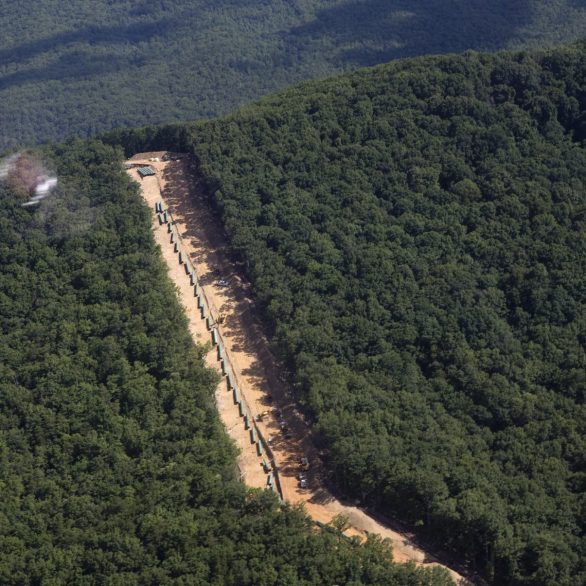
Mountain Valley Pipeline Water Permit Struck Down on Appeal
The Mountain Valley Pipeline faced a major setback Monday when the Fourth Circuit rejected yet another pivotal permit for the 303-mile natural gas pipeline.
The Sierra Club and other environmental groups sued the West Virginia Department of Environmental Protection in January, alleging that its approval of a water quality certification for the pipeline violated the Clean Water Act. The pipeline threatens local water bodies and the health of local communities, the petition for review alleged. Attorneys for Mountain Valley Pipeline argued that the department satisfied its obligation to reasonably consider the relevant issues and explain its decision.
The US Court of Appeals for the Fourth Circuit vacated the decision and remanded it to the agency, precluding the Army Corps of Engineers’ ability to issue a CWA discharge permit, and likely ruining MVP’s plans to put the pipeline into service in 2023.
“The certification reflected the Department’s conclusion that MVP’s activities during the pipeline’s construction would not violate the state’s water quality standards,” the Fourth Circuit said. “We find the Department’s justifications for its conclusions deficient and vacate the certification.”
Mountain Valley Pipeline has violated its construction permit 139 times over the course of two years and committed at least 46 narrative water quality standards violations, but the department said that the violations occurred because of the “size and nature” of the project, and claimed that MVP will comply going forward.
“The department cannot have it both ways and the blatant contradiction in its reasoning leaves its explanation wanting,” the panel wrote.
The $6.2 billion pipeline is more than 90% constructed, according to pipeline developers, a consortium led by Pittsburgh-based Equitrans Midstream Partners LP. Environmental groups dispute that characterization and say that that pipeline is closer to 56% complete.
In a statement, the developers said they are disappointed the permit was vacated once again.
“MVP has undergone unprecedented environmental review, and it is being built to higher environmental standards than any similar project that has ever been built in West Virginia or Virginia,” said Natalie Cox, an Equitrans spokesperson. “With total project work nearly 94 percent complete, Mountain Valley remains committed to working collaboratively with state and federal regulators to finish the remaining work and help ensure Americans have greater access to cleaner, reliable, and more affordable domestic energy.”
The project, proposed in 2014, aims to transport Appalachian shale gas to the eastern US—a cherished goal for the gas industry and politicians like Sen. Joe Manchin (D-W.Va.), who has been pressing Congress to expedite the project as part of federal permitting reform legislation. Manchin unsuccessfully tried multiple times to include the proposal in must-pass legislation in 2022, and he failed to get it included in a fiscal 2023 spending package released in December.
But the project has seen a slew of legal challenges and regulatory hurdles that have delayed its completion, which puts it more than four years behind schedule and nearly double the original cost.
Last year, the Federal Energy Regulatory Commission allowed the pipeline another four years to be placed into service, as multiple agencies rework federal permits following court orders.
Monday’s ruling likely delays the project for about a year, as FERC won’t allow the developers to resume construction without valid permits, ClearView Energy Partners, an independent research firm in Washington, wrote in a note to clients. The Army Corps had been planning to issue a permit by the end of April, and the Forest Service planned to act by the middle of May, the firm noted.
The only quicker avenue for the project is for Congress to pass a law approving the project by this summer—a provision supported by Manchin last year—but that prospect is “cloudy,” the firm wrote.
Judge Roger L. Gregory wrote the opinion, joined by Judges James Andrew Wynn and Stephanie D. Thacker.
The same panel refused to toss a key permit from the Virginia State Water Control Board last week.
“After countless violations of environmental safeguards and clean water protections, we know that MVP can’t be trusted to comply with the most basic standards of reasonable conduct,” said Patrick Grenter, director of the Sierra Club’s Dirty Fuels Campaign. “This project is already more than three years behind schedule, and billions over budget. With continuous legal setbacks, it has never been more clear that investors should stop throwing money at this doomed project and walk away.”
The Sierra Club has received funding from Bloomberg Philanthropies, the charitable organization founded by Michael Bloomberg. Bloomberg Law is operated by entities controlled by Michael Bloomberg.
The environmental groups are represented by Appalachian Mountain Advocates Inc. Mountain Valley Pipeline LLC is represented by Aqualaw PLC, Hunton Andrews Kurth LLP, and Jackson Kelly PLLC. West Virginia Department of Environmental Protection is represented by itself and the state’s Office of the Attorney General.
The case is Sierra Club v. W. Va. Dep’t of Envt’l Protection, 4th Cir., No. 22-1008, 4/3/23.
